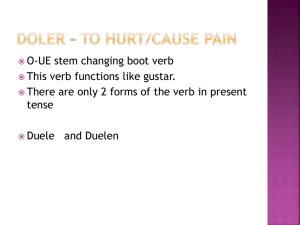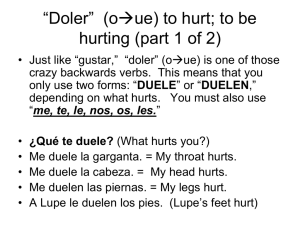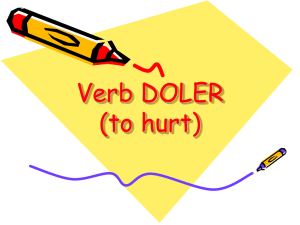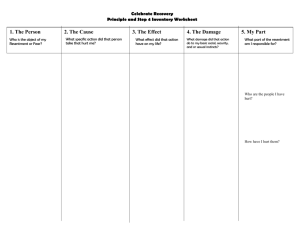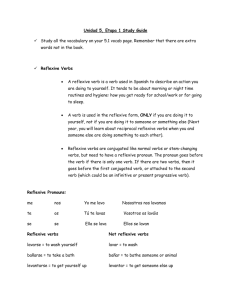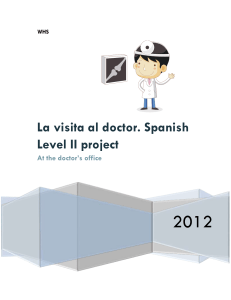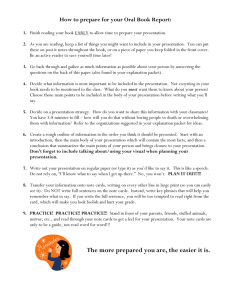duelen
advertisement
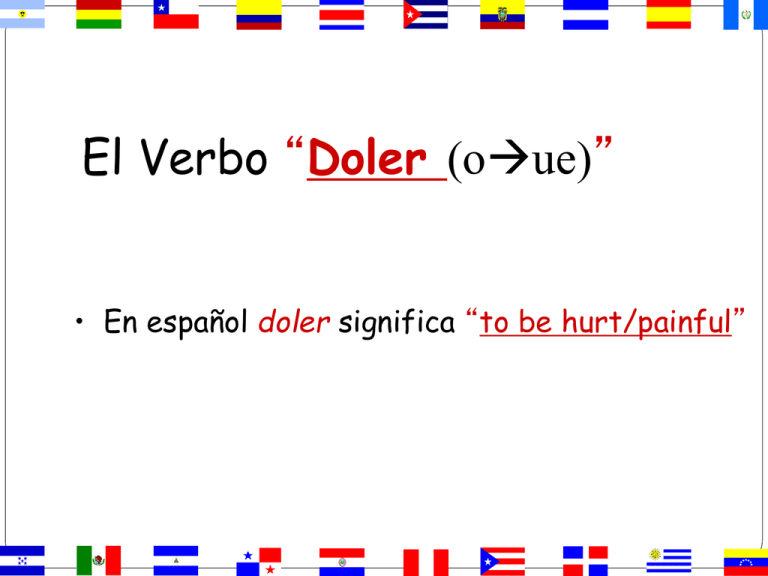
El Verbo “Doler (oue)” • En español doler significa “to be hurt/painful” Los verbos como Gustar 1. 2. 3. 4. 5. 6. 7. 8. 9. Gustar Encantar Disgustar Fascinar Interesar Molestar Parecer Faltar Doler (oue) 1. 2. 3. 4. 5. 6. 7. 8. 9. To be pleasing, like To love To disgust/displease/upset To fascinate/be fascinated by To be interested in To bother To seem To lack To hurt/be painful/cause sorrow Repaso: Doler Me duele Te duele Le duele Me duelen Te duelen Le duelen Nos duele Os duele Les duele Nos duelen Os duelen Les duelen + singular noun + plural nouns DOLER is conjugated just like the verb GUSTAR. There are only 2 forms! Doler is conjugated based on what’s being hurt. 1. Duele (refers to one body part / singular) 2. Duelen (refers to more than one body part / plural) Por ejemplo: • In English we say: • En español decimos: “My arm hurts” “The arm hurts me.” me duele el brazo iop + verb + subject En Español…: The word order is actually “backwards”: • The indirect object comes first: (Who is hurt) Me • Then the verb: duele • Finally the subject of the verb: (What body part hurts) el brazo. • Make it negative by adding “no” at the beginning. Who is hurt or in pain? Who is being affected? Indirect Object Pronouns: Me- me Nos – us Te – you Os – You guys - plural(informal) Le – him/her You formal Les – Them, You guys (plural) Frases de clarificación or emphasis: Put the “personal a” in front of the name or pronoun that refers to the person in pain . Me = a mí Nos = a nosotros Te = a ti Os = a vosotros Le = a él a ella a Ud. (a Roberto) (a Lola) (a tu hermano) Les = a ellos a ellas a Uds. (a Roberto y a Luis) (a Lola y a Carmen) (a mis amigos) ¡Cuatro partes! A (name or + pronoun) A Maria Indirect Object + Duele (n) + Pronoun verb who is being affected le duelen The noun (sing/pl) subject or what body part is causing the pain las piernas Maria’s legs hurt. The legs hurt Maria. DOLER is conjugated based on what’s being hurt. ¿Cómo se dice? My head hurts (me). (A mí) Me duele la cabeza. ¿Cómo se dice? Your arm hurts. (A ti) Te duele el brazo. ¿Cómo se dice? Our legs hurt. (A nosotros) Nos duelen las piernas. ¿Cómo se dice? Her ankle hurts. (A ella ) Le duele el tobillo. ¿Qué te duele? 1 2 3 4 5 6 Me duele la pierna. 6 Me duele la garganta. 2 Me duele la mano. 5 Me duele la cabeza. 1 Me duele el estómago. 4 Me duele el brazo. 3 ¿Qué te duele? 1 2 3 4 5 Me duelen los pies. 5 Me duelen las manos. 3 Me duelen los ojos. 1 Me duelen las piernas. 4 Me duelen las orejas. 2 1 Escribe doce frases. 4 2 3 5 6 7 9 8 10 11 12
